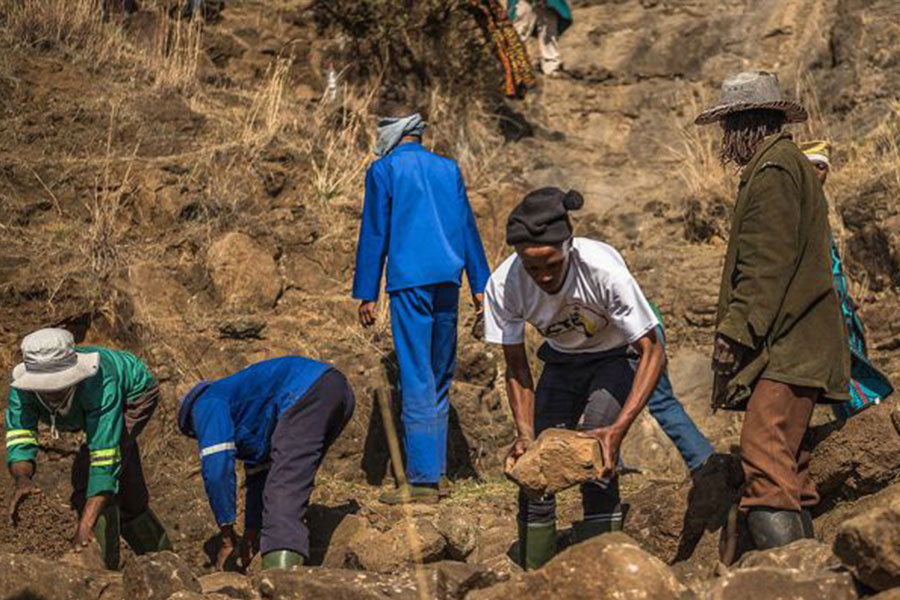
Sunday with Eden | Dec 07,2019
Mar 21 , 2020
Ethiopia’s decision to suspend its attendance of the Washington talks, supplemented by Sudan’s refusal to sign the draft agreement on the Nile sponsored by the US, did not result in anger in Addis Abeba or Khartoum.
On the contrary, many Ethiopians sighed with relief that the government declined to attend the latest meeting in Washington. They had worried that their country would not fare well in the negotiations heavily partial toward Cairo and had concluded that the US would tilt towards Egypt given the nation’s strategic position on Middle Eastern issues that have for long commanded the attention of US policymakers. The ensuing drama has confirmed their fears and raised doubts about how the US values its long-standing relations with Ethiopia.
Convinced that the Grand Ethiopian Renaissance Dam (GERD) would serve their water and power interests well, the Sudanese must have had their own concerns regarding where the relations between the three countries were headed in the wake of the Washington impasse. The nudge prompting a stronger reaction from Khartoum was provided by the one-sided resolution passed by the Arab League, which ignored Khartoum’s interests and the feelings of the general public in Sudan.
Given the position of two of the three governments engaged in the Washington talks and the public mood in the two countries, and in light of Egypt’s tendency to ignore the 10-nation Nile Basin Initiative, it will be necessary for the US Government to examine what it is that went wrong. Washington could choose to effect a course-correction or leave the parties to resolve their issues in accordance with the tripartite arrangements they reached earlier in 2015. What would be unfortunate is if the US opted to insist on the signing of the flawed agreement on the table.
The US has strategic interests in the Horn and Ethiopia is considered a key partner. Yet, Washington must have been convinced by Cairo that the involvement of the US would yield quick results, even over Ethiopia's objections.
After all, the US possesses considerable leverage over all the countries concerned. Contacts at the highest level between Washington and Cairo, encouraged also by Israel, must have created the sense that for Egypt to play a robust role in vital Middle East initiatives, Cairo would have to be relieved of the burden of dealing with a recalcitrant Ethiopia and an increasingly assertive Sudan on the issue of the Nile.
The US must have been led to believe that a combination of pressure and inducements would do the trick. Hence, the haste with which a series of meetings were scheduled in the belief that an agreement would be reached within two months.
That this has not been possible will not sitwell in Washington. Time and fact-based persuasion will be required if the US is to look at the issue with a new, more objective, justice and fairness-based lens. This may take time as disappointment with Ethiopia - and to some extent with Sudan - notwithstanding, the US is currently preoccupied with far more urgent issues starting with COVID-19, to give the required attention to an age-old issue that is fraught with public emotion and national ego.
SIDEBAR
For the US to resume negotiations with the objective of reaching a fair agreement, Washington will have to recommit itself to address the issues of the Nile in a comprehensive way. This will require patience and a keen sense of justice and fairness. It will demand the same level of human solidarity with the peoples of all the countries concerned.
One would have to give proper weight to the requirements of the 40 plus million people of Sudan and the 110 million people of Ethiopia just like those of Egypt and treat the issue accordingly.
A rethinking of the issue will have to dig a bit deeper into the background of the Nile crisis if it is to have a chance of achieving success. The issues that would need to be brought to light include the following:
Since Ethiopia decided to build the GERD, it has undertaken consultations with Egypt and Sudan over the past nine years, making it clear that the dam is designed to generate power and not to cause harm to the people of Egypt. Unfortunately, the Egyptian public has not been honestly informed.
A quick review of the recent history would draw a clear picture of how the Nile issue - and Egypt's single-minded exploitation of its position - has played a central role in fueling and aggravating the disputes and tensions that continue to challenge the Horn of Africa.
That is why it is essential to understand the context, as it brings into focus the path that has brought the parties to the present state of affairs. This will enable mediators and observers to recognise without difficulty the basic injustice that is inherent in the status quo.
They will wonder how such a biased and non-inclusive system could have endured all these years. They will have to labour over how to redress this fundamental wrong.
It is only when the parties see that their needs are being fairly considered that they will engage in a sincere manner to enter a new and sustainable agreement. It is only when each party is compelled to recognise the other's right to make progress that compromise can be achieved in a way that ensures such injustice will not continue.
Will the US wish to embark on this arduous road?
Anything less will not do.
PUBLISHED ON
Mar 21,2020 [ VOL
20 , NO
1038]

Sunday with Eden | Dec 07,2019

Radar | Sep 14,2019

Commentaries | Oct 10,2020

Viewpoints | Nov 14,2020

Radar | Dec 24,2022

Fortune News | Jun 10,2021

Editorial | Aug 29,2020

Viewpoints | Sep 06,2025

Commentaries | Sep 11,2020

Radar | Nov 06,2021

Photo Gallery | 180920 Views | May 06,2019

Photo Gallery | 171113 Views | Apr 26,2019

Photo Gallery | 162251 Views | Oct 06,2021

My Opinion | 137336 Views | Aug 14,2021

Dec 22 , 2024 . By TIZITA SHEWAFERAW
Charged with transforming colossal state-owned enterprises into modern and competitiv...

Aug 18 , 2024 . By AKSAH ITALO
Although predictable Yonas Zerihun's job in the ride-hailing service is not immune to...

Jul 28 , 2024 . By TIZITA SHEWAFERAW
Unhabitual, perhaps too many, Samuel Gebreyohannes, 38, used to occasionally enjoy a couple of beers at breakfast. However, he recently swit...

Jul 13 , 2024 . By AKSAH ITALO
Investors who rely on tractors, trucks, and field vehicles for commuting, transporting commodities, and f...

Nov 1 , 2025
The National Bank of Ethiopia (NBE) issued a statement two weeks ago that appeared to...

Oct 25 , 2025
The regulatory machinery is on overdrive. In only two years, no fewer than 35 new pro...

Oct 18 , 2025
The political establishment, notably the ruling party and its top brass, has become p...

Oct 11 , 2025
Ladislas Farago, a roving Associated Press (AP) correspondent, arrived in Ethiopia in...

Nov 2 , 2025
The National Bank of Ethiopia (NBE) has scrapped the credit-growth ceiling that had s...

Nov 2 , 2025 . By SURAFEL MULUGETA
The burgeoning data mining industry is struggling with mounting concerns following th...

Nov 2 , 2025 . By YITBAREK GETACHEW
Berhan Bank has chosen a different route in its pursuit of a new headquarters, opting for a transitional building instea...

Nov 2 , 2025 . By BEZAWIT HULUAGER
Nib International Bank S.C. has found itself at the epicentre of a severe governance...